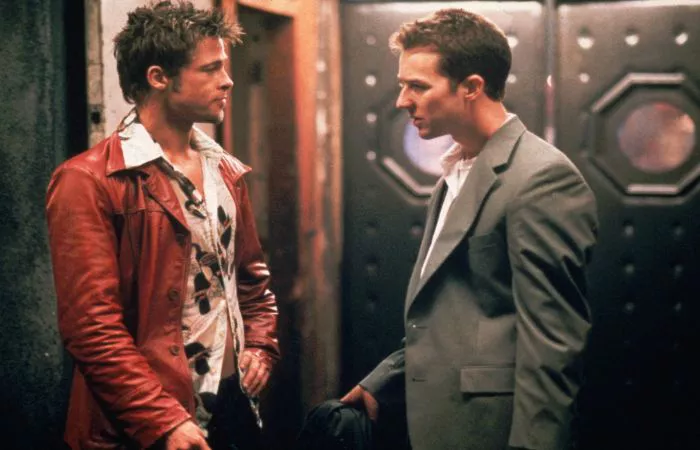Directed by David Fincher and based on Chuck Palahniuk’s novel of the same name, “Fight Club” is a provocative and controversial film that explores themes of masculinity, consumerism, identity, and societal disillusionment. Released in 1999, the film has garnered a cult following and sparked intense discussions about its meaning and social commentary. In this review, we delve into the elements that make “Fight Club” a compelling and thought-provoking cinematic experience.
Plot and Narrative
The plot of “Fight Club” revolves around an unnamed narrator (played by Edward Norton), who is dissatisfied with his mundane existence and struggles with insomnia. Seeking solace, he attends support groups for various afflictions, where he meets Marla Singer (played by Helena Bonham Carter), another troubled individual. The narrator’s life takes a dramatic turn when he encounters Tyler Durden (played by Brad Pitt), a charismatic and anarchistic soap salesman.
Together, the narrator and Tyler form an underground fight club as a form of catharsis and rebellion against societal norms. As the fight club gains popularity and evolves into a larger anti-establishment movement, the narrative takes unpredictable and darkly existential turns.
Themes of Masculinity and Identity
“Fight Club” explores complex themes of masculinity, identity, and self-discovery. The protagonist’s journey is characterized by his struggle to assert himself in a world dominated by consumerism and emasculating societal norms. Tyler Durden becomes a symbol of unrestrained masculinity and freedom, leading the narrator down a path of self-destruction and self-discovery.
Through the lens of fight club, the film examines the darker aspects of male identity and the consequences of toxic masculinity. The narrator’s existential crisis reflects broader societal anxieties about individualism and the pursuit of authentic identity in a commercialized world.
Social Critique and Anti-Consumerism
At its core, “Fight Club” is a scathing critique of consumerism and the dehumanizing effects of modern capitalism. The film exposes the emptiness of materialism and the quest for superficial fulfillment, urging viewers to question the value of possessions and societal expectations.
Tyler Durden’s anti-consumerist manifesto resonates with disaffected viewers seeking meaning beyond material wealth. The film’s portrayal of urban decay and spiritual malaise serves as a stark reminder of the pitfalls of consumer culture and the quest for individual agency in a conformist society.
Cinematic Style and Visual Aesthetics
David Fincher’s direction imbues “Fight Club” with a distinctive visual style and atmospheric intensity. The film’s gritty cinematography, edgy soundtrack, and stylized editing contribute to its raw and visceral tone. Fincher’s use of subversive imagery and surreal sequences enhances the film’s exploration of psychological turmoil and existential angst.
The juxtaposition of brutal fight scenes with introspective voiceover narration creates a dynamic narrative tension, immersing viewers in the protagonist’s turbulent psyche. The film’s inventive visual storytelling resonates with its thematic exploration of personal rebellion and societal critique.
Controversy and Interpretation
“Fight Club” sparked controversy upon its release due to its provocative content and ambiguous message. Some critics viewed the film as a dangerous glorification of violence and nihilism, while others praised its subversive social commentary and psychological depth.
The film’s twist ending and unreliable narrator invite multiple interpretations, with debates continuing to unfold about the true meaning of “Fight Club.” Is it a cautionary tale about the dangers of unchecked male aggression, or a nuanced exploration of existential angst and societal rebellion?
Legacy and Cultural Impact
Despite its initial polarizing reception, “Fight Club” has achieved cult status and remains a touchstone for Generation X disillusionment. The film’s iconic quotes, memorable characters, and philosophical underpinnings have permeated popular culture, inspiring discussions about masculinity, rebellion, and the quest for authenticity.
“Fight Club” continues to resonate with audiences as a daring and provocative exploration of contemporary anxieties and societal alienation. Its enduring legacy lies in its ability to challenge viewers’ perceptions and provoke introspection about the complexities of human nature and the pursuit of individual freedom.
Conclusion
In conclusion, “Fight Club” is a daring and thought-provoking film that defies easy categorization. Through its exploration of masculinity, identity, consumerism, and societal rebellion, the film challenges viewers to confront uncomfortable truths about modern existence.
David Fincher’s stylish direction, coupled with powerful performances by Edward Norton and Brad Pitt, elevates “Fight Club” beyond conventional genre conventions, creating a cinematic experience that lingers in the mind long after the credits roll. Whether celebrated as a cult classic or critiqued for its controversial themes, “Fight Club” remains an enduring testament to the power of cinema to provoke discourse and challenge societal norms.
Related Topics:
Film Review: “Schindler’s List” (1993) Directed by Steven Spielberg
Top 10 TV Show in Television History

